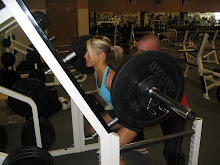This is one of the best articles I've read that reinforces the approach to weight loss I encourage (high-intensity circuit or threshold training combined with proper nutrient timing). This focus goes beyond the old paradigm that weight loss or gain is soley dependent on the number of calories in vs. calories out. The latest Nutrition and Exercise Science has been showing more and more that weight gain and weight loss IS ALL ABOUT ALTERING YOUR METABOLISM!
Here is Part I of a III-point series I'd like to share with you. The article, called "The New Science of Weight Loss" is written by Lou Schuler and found in the fook "The New Science of Lifting" by Schuler and Alwyn Cosgrove.
Part 1: Energy Balance Is The Key To Weight Control
If you want to understand energy balance in an instant, think of your body as a car that operates 24 hours a day, says Dan Benardot, Ph.D., R.D., a nutrition researcher at Georgia State University in Atlanta. You would never expect your car to get you from one place to the next without systematic refueling, just as you know there's no point in putting more gas in the tank than it's designed to hold. But that's how many of us operate our bodies.
We try to run on empty for hours, then dump in more fuel than we can handle. Benardot's research shows how self-destructive this strategy is.
Let's say you really want to lose fat, and decide to jog first thing in the morning, on an empty stomach. "The easiest way to get energy is to break down muscle mass," Benardot says. Your body can convert specific amino acids--the building blocks of muscle--to glucose, the sugar that powers human activity. "Someone running before eating may actually be breaking down the very tissue he's trying to improve. Sounds counterproductive to me."
Call it the "muscle loss" diet.
The second way is probably more typical of most of us. You can call this one the "fat gain" diet. You wait a long time between meals, and then, when you're ravenously hungry, you wipe out an entire buffet line. This guarantees that you'll get a larger surge of the hormone insulin than you ordinarily would. That means more fat storage. And you can probably combine the "muscle loss" and "fat gain" strategies and turn your body into a perfect muscle-burning, fat-storing machine. Hard exercise slows down appetite in the short term, but as you get used to it, your appetite matches your exertion level. So if you go out and run 10 miles on an empty stomach, then eat enough to fuel a 15-mile run, the net effect is that you've lost muscle on the run and gained fat from the postrun meal.
Energy balance, the focus of Benardot's research, is the answer to both of these dilemmas. The athletes in his studies get the best results when they stay within 300 to 500 calories of perfect energy balance throughout the day.
This means . . .
1. Eat as soon as you wake up in the morning.
2. Make sure you eat something before you exercise, no matter what time of day it is.
Not only does the food prevent your muscle tissue from becoming cardio chow, but it increases the number of calories you burn during and after exercise. A 1992 study at Arnot-Ogden Medical Center in Elmira, New York, shows that exercise following a meal enhances metabolism.
3. Eat soon after exercising, when your body has depleted its energy stores. Act fast, or you'll start burning muscle for energy.
4. Eat a total of five to six small meals a day.
One of Benardot's studies showed that athletes who added three daily snacks to their three squares lost fat and gained muscle, on top of improving in all the other things that are important to athletes, such as power and endurance. Of course, you can't simply add a few hundred calories to your diet and lose weight, but you can redistribute your daily calories so you're eating more often but consuming less at individual meals.
However you do it, it's clear to Benardot that the worst strategy is cutting out tons of calories indiscriminately in hopes of sudden, dramatic weight loss. "If you're more subtle and try to lose a pound a week or 1 pound in 2 weeks, not only can you do it, but you'll be less likely to regain the weight," he says.
Wednesday, October 3, 2007
Subscribe to:
Post Comments (Atom)



2 comments:
good one, jess!
jeff & i read it, although he was hoping for more belly laughs like your last blog.
he runs on an empty stomach, so that was good for him. i do the other one, so that was good for me.
can't wait for the rest...
no more working out on empty for me! You're brilliant Jess, and I am so glad that you have this blog!
Post a Comment